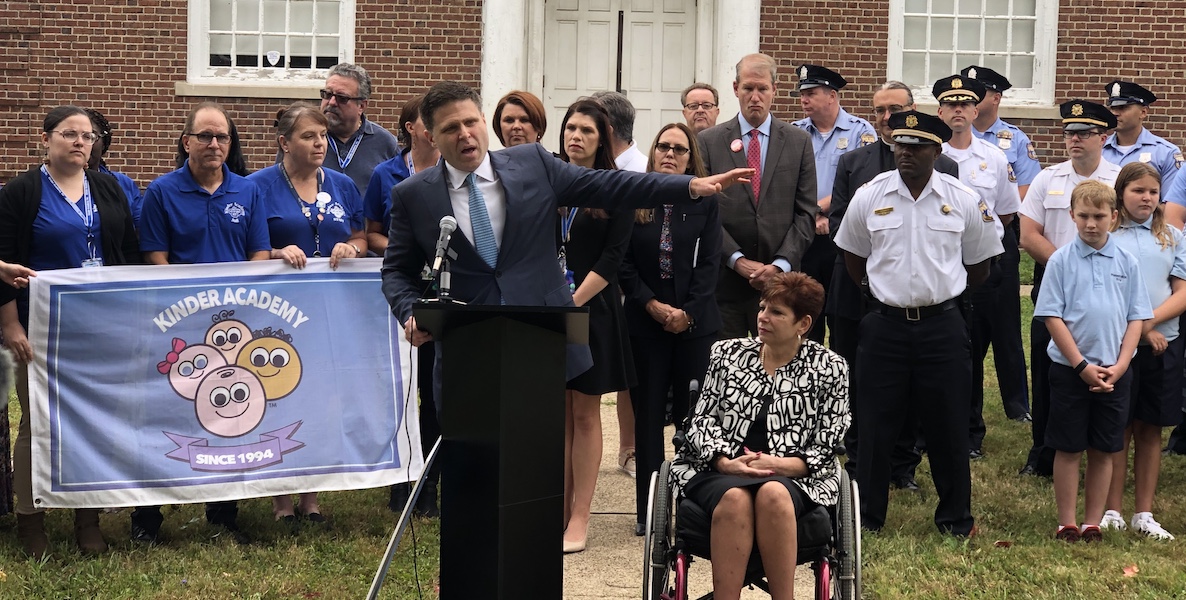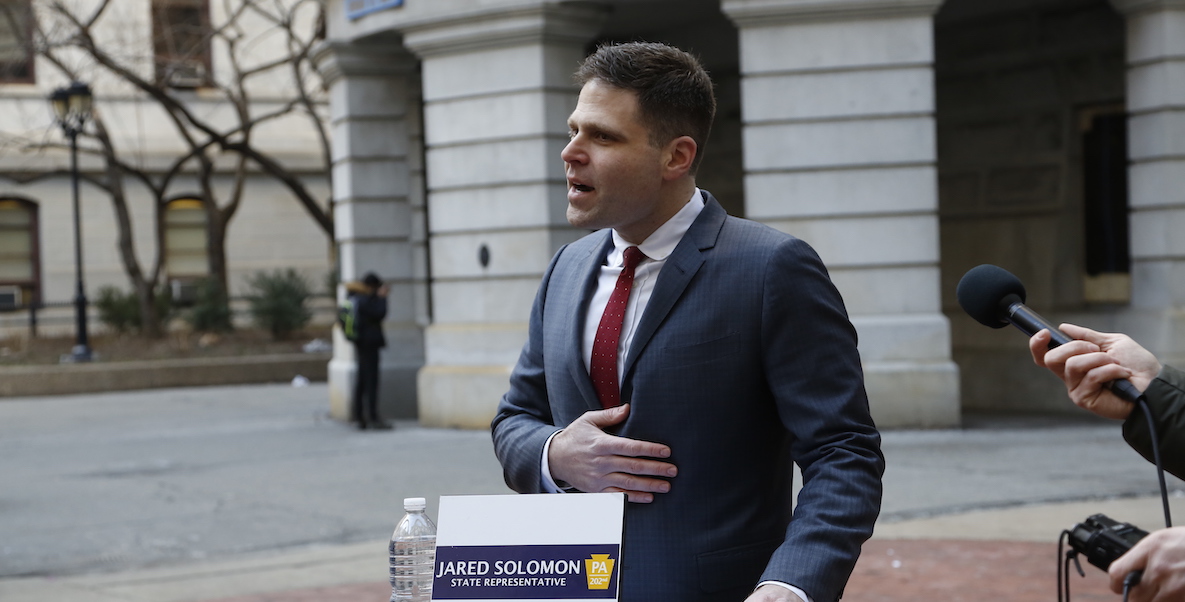In their matching plaid kilts and baby blue golf shirts, the cluster of 12-year-old girls peered through the window into the abandoned building, carefully avoiding the peeling paint around the windows and the wet trash beneath their feet.
It was an uncharacteristically chilly, gray Friday morning in the Northeast, when the rest of the city’s student body was in school. But these tweens weren’t cutting class—they were invited to celebrate the good news:
![]() Thanks to the hard work of State Rep. Jared Solomon—the Northeast native who, since his election in 2016, has relentlessly championed the neighborhood that raised him—the historic Trinity Church Oxford Parish House would not only avoid being razed and turned into a Royal Farms, but would come back to life as the site of a Kinder Academy daycare center and Police Athletic League (PAL) rec center.
Thanks to the hard work of State Rep. Jared Solomon—the Northeast native who, since his election in 2016, has relentlessly championed the neighborhood that raised him—the historic Trinity Church Oxford Parish House would not only avoid being razed and turned into a Royal Farms, but would come back to life as the site of a Kinder Academy daycare center and Police Athletic League (PAL) rec center.
“I’m excited for PAL, because I like hanging out with my friends here, and we like to play baseball together and we like all the sports that they have, and it’s free,” said Alexis Haggerty, 12, one of the students in attendance.
Over the last two years, Solomon has successfully quarterbacked a team of local leaders, such as Paul Steinke, executive director of the Preservation Alliance for Greater Philadelphia, State Senator Christina Tartaglione, Stephanie Wein of PennEnvironment, Trinity Church Oxford vestryman Kyle Sammin and the Philadelphia Police Department, to have the sprawling, red-brick building—built in 1928—designated a historic landmark, while piecing together a roster of tenants that would enhance a community facing economic decline.
“Property values were on the decline, poverty was up to 62 percent, our business corridors were deplete of economic opportunity,” Solomon explains. “I wanted to be a great convener of bringing folks together to change that narrative.”
“There aren’t a lot of representatives who go to fight for spaces like this, the way that he was an advocate,” Wein says.
It seems like a no-brainer—nothing newsworthy—to take a neglected space and turn it into a community hub. But as any Philadelphian can tell you, there are enough devotees of the status quo to make even the most positive changes a battle. Facing declining membership and bleak finances, the church had been prepared to sell the land to Royal Farms (never mind that there’s a WaWa across the street); concerned community members were understandably outraged, dreading increased traffic and decreased communal space in the neighborhood. The two sides couldn’t come to an agreement.
Enter Solomon.
“There are a group of people who still want this neighborhood to look like and have the same stores and make up and feel that it did in the 1960s, 1970s,” says Solomon, who’s fond of half-joking that everyone in the Northeast has his cell phone number. “But I feel like I have brought everyone to the table, and we’ve done a great job of creating an open space and building community.”
Now, the daycare center envisions opening as soon as this spring, anticipating full enrollment next fall while bringing 30 jobs to the community. “PAL is scheduled to open once all funding is secured,” Solomon says. “Senator Tartaglione has committed
“There aren’t a lot of representatives who go to fight for spaces like this, the way that he was an advocate,” says Stephanie Wein, Water and Conservation Advocate for PennEnvironment, who was on hand for the announcement. “PennEnvironment spends a lot of time in Harrisburg and in districts trying to put the environment higher up on representative’s priority list, and it’s nice when we’re not the one having to do that, when the representatives are making it a priority on their own.” She points to the fact that Solomon is also a supporter of an anti-litter measure in the legislature, the Zero Waste PA package that PennEnvironment works on. “If more representatives came forward and advocated and were champs for the environment and for green space, our job would be a lot easier.”
“Property values were on the decline, poverty was up to 62 percent, our business corridors were deplete of economic opportunity,” Solomon explains. “I wanted to be a great convener of bringing folks together to change that narrative.”
Elected officials should naturally listen to constituents and bring people together to make positive changes in the communities they represent. But in these divided political times, more than ever, Solomon’s approach is borderline revolutionary. Politicians generally do three things: pass (or try to pass) laws; bring home money from the state budget; and constituent services, of the street-plowing kind. This is none of the above. Instead, it’s Solomon serving as a de facto mayor of the Northeast—reaching out to constituents, understanding their needs, bringing them together and actually making things happen, all in the interest of community development that speaks to the needs of the community.
It’s work Solomon promised he’d do when he defeated longtime Rep. Mark Cohen ![]() for the seat back in 2016—and what he was already doing before he officially had a constituency, through the community group he launched in the Northeast to fill what he saw as a gap in services. Since his election, bringing opportunities to the Northeast has been a throughline of Solomon’s tenure. He has brought the Night Market to his community, as well as performances by the Philadelphia Orchestra, the Pennsylvania Ballet and others as a way to braid the cultural events of the city with the unique culture of the Northeast. His next big success story—an education center with GED courses from Harcum College, job-training, ESL, and more—is set to open its doors in nearby Castor and Wellington Avenues, in the coming months.
for the seat back in 2016—and what he was already doing before he officially had a constituency, through the community group he launched in the Northeast to fill what he saw as a gap in services. Since his election, bringing opportunities to the Northeast has been a throughline of Solomon’s tenure. He has brought the Night Market to his community, as well as performances by the Philadelphia Orchestra, the Pennsylvania Ballet and others as a way to braid the cultural events of the city with the unique culture of the Northeast. His next big success story—an education center with GED courses from Harcum College, job-training, ESL, and more—is set to open its doors in nearby Castor and Wellington Avenues, in the coming months.
For Solomon, the benefit of creating a state-of-the-art PAL facility on the former church grounds hearkens back to his own childhood in the Northeast, when he did everything baseball, including play with the Padres at the Max Myers Rec Center. “I’m not saying that that Padres were the best childhood ever, and we need to bring back baseball and I wish kids played more baseball and stickball because those were the good old days—no, no!” Solomon says. “ All I’m saying is I want the next generation to have some experience, whatever that is, whether it’s at the PAL or making up their own narrative, we just need to create those venues, those opportunities, so that magical things can happen for the next generation of kids.”
One of that next generation, 12-year-old Sophia Miller, already sees PAL and Trinity Church Oxford’s evolution as more than a place to play sports. “I’m excited because I want to see the community come back together,” Miller says. “And instead of being, like, a hateful place, I want everyone to love and respect each other.”
Photo courtesy PA House



